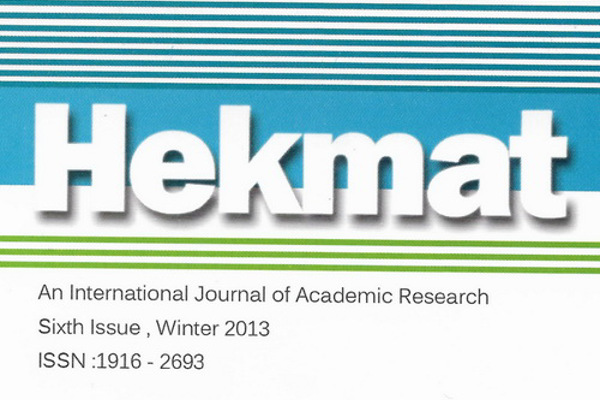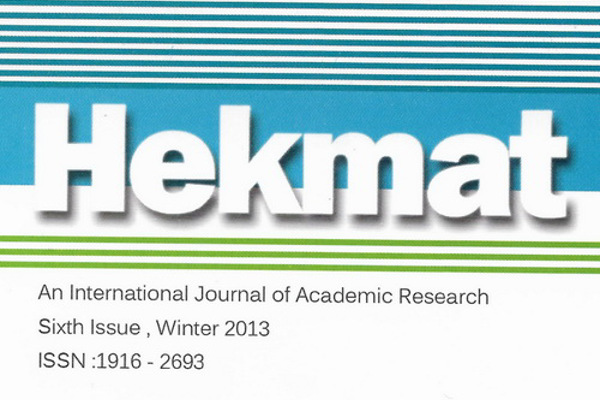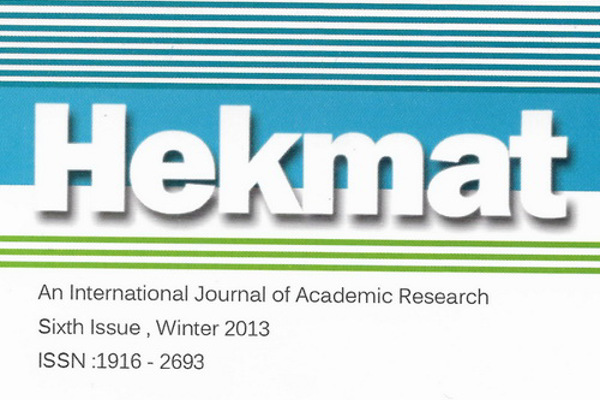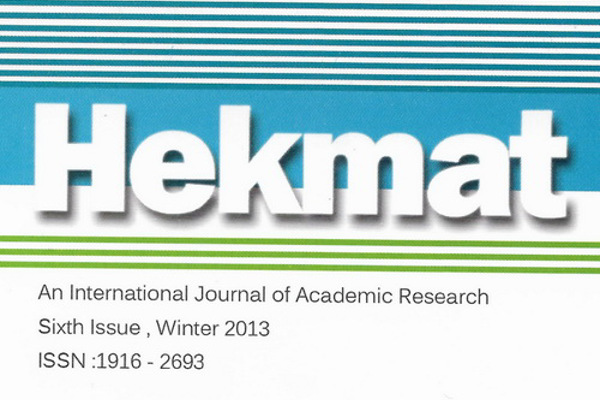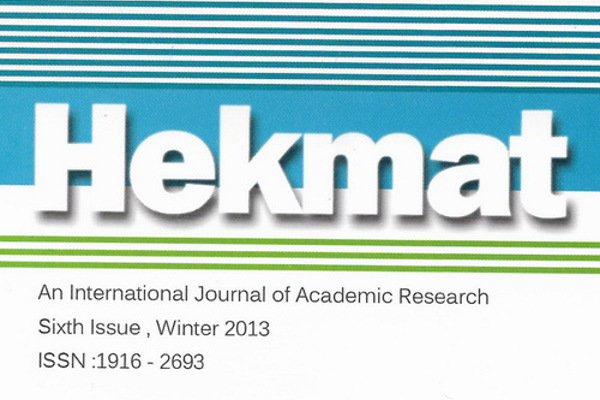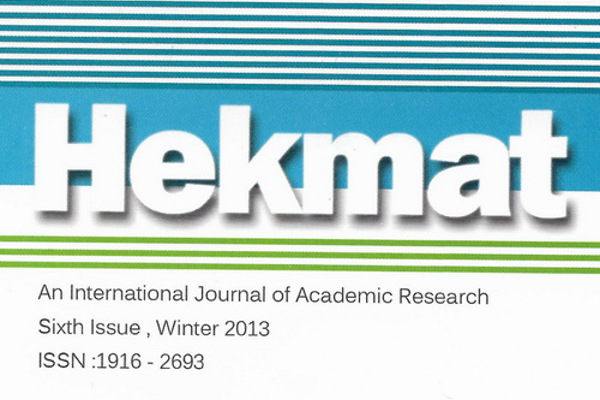The Fundamentals of Sustainable Utilization of Natural Resources According to the Quran / By: Dr. Mohammad Hassan Mozafari Ph.D.
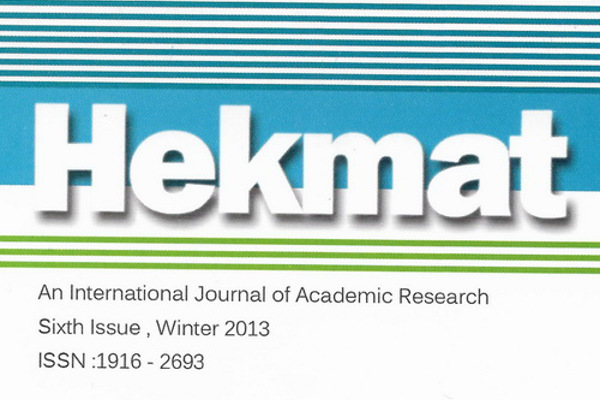
The Fundamentals of Sustainable Utilization of Natural Resources According to the Quran
Dr. Mohammad Hassan Mozafari Ph.D.[1]
Abstract
Intellectual, philosophical, and cosmological foundations of any school of thought constitute the fountain spring of principles and rules that govern the themes and topics dealt with in that school of thought and play a pivotal role in the integrity and soundness of the notions it proposes. From this departure point, this paper tries, as much as the limits of the author’s expertise allow, to introduce the outline of the pattern of sustainable utilization of natural resources as the Quran prescribes in terms of the following principles: the right to utilize common heritage being shared by all people, man’s responsibility to construct and build the earth, man’s obligation to observe his responsibilities both in production and consumption, understanding bounties as a means of test man undergoes, guaranteeing that human efforts remain consistent with norms of creation and finally, the right to utilization as a central right of man.
Introduction
A propaganda crusade against religion has been waged for decades by proponents of secular liberalism as well as communities and socialists in general under the pretence of disclosing the negative role of faith in society. Although their claims about superstitions spread by the church and atrocities it committed against science, scientists and different classes of society in the middle ages do reflect the truth in part, yet, to generalize this claim to the case of Islam was no more than a grave injustice made to that religion. In addition, their record of superstitious outlooks, crimes and atrocities not only against humanity but also other species of animals, even plants and the environment in general is filled with far greater marks both qualitatively and quantity wise and is in some cases unprecedented. The extinction of kinds of plants and some species of animals and the scale of destruction of the nature in the last few centuries and especially in recent decades as the result of the manipulation of science and technology by irreligious governments and states fighting faith is horrible and incomparable to any period of time before. Many authors in the west have now come to realize that the reason behind this calamity is partly man’s turning his back to spirituality and tradition in the modern age, hence their call to return to faith and traditions of the past in order to control the pace as a vital need.
The revival of spirituality and religious education in industrial societies can be discerned in fresh activities going on nowadays in universities and international organizations in forms of forums and conferences of various kinds and levels. The majority of these activities are directed towards exploring remedies for repercussions of scienticism and materialism of the past few centuries rather than a quest for human spiritual development and growth though. In the midst of this, it is worthwhile noting that Islam as a moderate and balanced religion can be considered a sours of inspiration for man seeking a style of life that reconciles the domain of theory with that of praxis in the present age and bridges materialism to spirituality and dissolves the dichotomy of religiosity and terrestrial life thereby guaranteeing prosperity in life and salvation in the hereafter without sacrificing one for the sake of the other[2].
To meet the aforementioned research requirements and the present needs of society, this paper tries to directly reflect on the Quranic precepts concerning foundations and principles of utilization of natural resources. As a prelude, it is useful to explain the role of beliefs and values people hold in forming the direction of their behavior in every field of life.
The role of beliefs and values in sustainable consumption
Human behavior is partly directed and controlled by instinct and partly by beliefs. This is a common sense truth. The system of belief and values man adheres to constitutes software that controls, directs and somehow manipulates all man’s capacities including his very body, thought, knowledge, skills and other material as well as spiritual capabilities as hardware and instrument. In the same way, society too is controlled and directed by the system of beliefs and values it enjoys. So, management of consumption in society is largely indebted to and influenced by the values and beliefs predominant therein. To illustrate this point further, we can compare two groups of consumers. One group sees the world as a set of meaningless phenomena, a bulk of things thrown over there as it is, with no purpose no design, no owner, no identity and no message[3] . The second group sees the world an ordered hole, with a purpose and design, owned by a Lord to whom he is accountable. [4] Obviously, these two groups make different policies for utilization of natural resources. One major difference between modern western civilization and a civilization based on Quranic culture stems from this point.
It is most unfortunate to see that the majority of owners and managers of multinational companies and national ones in the west behave as though they believe the world to be a target they are to utilize to the end and its natural resources a treasure to encroach to the maximum possible amount without any accountability on their part. This is the root of so many problems like contamination of environment, destruction and excessive exploitation of resources that have befallen man. Both capitalism and socialism are watered from the same materialist spring despite so many disagreements they have on numerous issues.
On the other side of the extreme we behold idealist positions by extremist green movements that line up not only against uncontrolled exploitation of natural wealth but also against reasonable utilization thereby depriving mankind the bounties of Mother Nature.[5] Betwixt these extremes stands Islamic precept of “the middle nation” that calls to moderation, realistic approach and balanced civilization far from all forms of extremism. The Quran as divine word rejects both of the extreme courses. [6]
As a holy book, the Quran influences the life of hundreds of millions of its followers in Muslim countries of Asia, Africa, and Europe via the messages and commands concerning environment which renders it particularly significant. The Quranic precepts are capable of managing patterns of consumption and utilization both on personal and social scales though Muslim nations are yet held deprived of the merits of theses teachings unfortunately due to the low level of public awareness among Muslims about this wealth of civilization and its values.
The change in the pattern of consumption has nowadays become indispensable in society. Yet the question is still open; can a society change its patterns of behavior without a fundamental change in the set of beliefs and values it holds? As dispositions, visions and understanding constitute the basis of the style of life one opts for, beliefs and values pertinent to ownership and consumption as well as the outlook towards capital and riches society entertains must first be treated and corrected before the consumption pattern undergoes any shift. A total revision in society’s mentality about its legal and ethical position towards vital resources must be done on the level of the state, the government, private sector as well as every individual person before any advancement in the patterns of behavior is actually effected. In this paper we shall address themes like the right of all people to utilize common heritage, man’s responsibility to work for the development and construction of the earth, the obligation to observe ones responsibilities in the process of production and consumption, considering bounties as a means by which man is put to test and finally, the obligation to keep ones effort in the field consistent with the aims of creation and based on rights.
The Quran on fundamentals of sustainable utilization
Natural resources and environment have been so gravely contaminated, mal - exploited, ruined and virtually destroyed that everybody has now begun to think about revising patterns of production and consumption thereby changing their style of life irrespective of religious or philosophical affiliations and materialistic or spiritualistic tendencies. Despite this fact, it matters much what the basis of this change of attitude is. For, if their motive is only to evade the danger threatening the life of mankind, animals and plants on this planet the outcome will differ from the case when beliefs and values their adhere to make them embark on such a whole scale shift. Based on the balanced position the Quran holds towards the world and the life embodied in the motto “the middle nation”, it establishes certain principles that must govern utilization of natural resources. They are as follows:
1. Acknowledging the right of all people to utilize common heritage
Unlike modern theories that consider social contract as the foundation of rights, Islam believes that rights stem from Divine Will pertinent to both creation as well as legislation. The creator of the world has nourished man with whatever He knew that man may need in order to protect his body and soul and has also taken care of animals and plants and all other beings hence bestowing all these innumerable invaluable bounties. He has recognized the right for all human beings to benefit from these bounties expressively in The Quran where he states that all these bounties are meant to be “for man” and that He has “given mankind” all these bounties. The Quran says: “it is Allah who created the heavens and the earth and poured water from the sky so as to gift you fruits as your livelihood… and gave you control over rivers and controlled the sun and the moon that ever move diligently for your benefit and deployed the day and the night for your benefit and gave you all what you asked Him and you cannot… God’s bounties even though you try.[7] He has not overlooked even human aesthetic sense therefore has decorated the sky for watchers thereby acknowledging human right to pleasant perspective: “verily we have equipped the sky with towers and decorated it for watchers”. We should bear in mind that world legal systems have not yet enhanced enough to enact laws realizing the right to pleasant perspective for human beings. Another important right is the right to food and equality of all human beings in the right to provide for their needs: “… and He created mountains on the earth on its top and blessed them and measured therein their nourishment in four days equally for all.” A tradition says that trees and plants too enjoy this right: “God produces the sustenance of all living creatures including human beings, animals, birds, worms, terrestrial and marine lives, plants, trees and whatever animals need from the earth.”[8] These Quranic verses and traditions and other ones we shall later mention vividly state the right of utilization of God-given resources and gifts to be shared by all people. Since man enjoys intelligence, free will and freedom of choice he is responsible of observing the rights all creatures enjoy.
The Quran has frequently reminded man of the fact that the real ownership of everything on this planet and in the heaven and betwixt them solely belongs to God. “Only to God belongs what exists in the heavens and on the earth”. “God is the only heir of the heavens and the earth”. Had the Quran not mentioned this fact, still man could have realized how fragile and provisional his possession of even his body and soul is with minimum reflection.[9] Everyone understands that his ownership of all what he possesses is based on contracts and can witness that his very being depends on the will of the Unique Almighty God.[10] As the genuine owner of the universe, Almighty God has given the right to utilize resources to all human beings as members of his family[11] through two statements:
- In addition to the appointment of man as viceroy on the earth by God stated in the Quran, it is also reiterated that the whole universe is “made” for man, “meant” for man and “created” for man. This implies the right of man to utilizing every other being for his benefit. The Arabic phrase لکم"” meaning “for you” states ownership. The Quran says of people that they are owners of the universe either in the sense that the universe is the object of their collective possession or that they collectively enjoy the right to benefit from it. This ownership is public, common, shared by all and collective. This means that no sect, class, ethnicity, nation or generation enjoys any advantageous right besides the right shared by all equally.
- The Quran reveals the command issued by God and directed to man appointing him as His viceroy on the earth: “Verily, I am appointing a viceroy for the earth” [12] and narrates another order charging him with the obligation to undertake the task of providing for the needy from the riches He endows him with, and give from that which He has given you in the capacity of His viceroy as alms”. So, God has trusted man with the common natural heritage and charged him with responsibilities proportionate to the capacities He has endowed him with. This indicates that natural wealth is not exclusively men. Mankind is one gust among many others whom God nourishes.[13]
- Man is the soul responsible creature. He can act on behalf of God when utilizing resources.[14] When the Quran recognizes this status for man in the world, it acknowledges sovereignty of man over nature both creatively and legislatively. This is a vivid recognition of human right to use and benefit from natural wealth.[15]
Thus, all human beings are gifted the right of utilization equally. People must observe regulations concerning this utilization so as to safeguard the interests of all living beings and protect the rights of future generations.
Natural resources including water, air, land, plants, woods, and goods produced via changes man make in these elements to prepare them for consumption constitute consumable commodities. No product is possible without these natural items. In Chapter Fajr verses 15-24, the Quran condemns and reprehends the egoistic and monopoly seeking attitudes man may have towards the wealth at his disposal which God names “heritage”.[16]
Within the framework of these laws and regulations, God has bestowed on man all theses bounties leaving them to his trust and charging him with the task of utilizing them as His viceroy[17] in order to embark on the construction of this world and protection of natural resources of life with the sense of responsibility. Man is responsible for his development and the realization of his capacities for spiritual and material progress.
The constitution of the Islamic Republic of Iran and the laws ramified from it are based on this foundation and recognizes natural resources as public property. The forty fifth clause of the constitution numerates public properties and charges the state with the task of handling them according to the interests of the nation. The common laws enacted in the framework of the constitution pursue the same aim. For instance, the law concerning protection and utilization of the marine life in the country declares the resources within the jurisdiction of the state including internal, border and costal areas as national wealth. This is reiterated in other laws related to natural resources. It is the responsibility of the state to look after these resources and manage their utilization. It is unfortunate that these laws are not implemented thoroughly so this common heritage is not evenly and fairly distributed among all regions and provinces hence the advantageous benefits by few opportunists.
The notion of “common human heritage” in international law
The concept “common human heritage” as appearing in the documents of international law does not cover the idea we have in mind of human heritage. The expression “common human heritage” emerged in the circles of international law three decades ago and has been used ever since to denote the resources located in free parts of the world such as oceans, seas and poles where no particular states exercise sovereignty. It was third world countries beholding the merciless exhaustive use of these riches by industrial nations that coined this expression by voting for regulations checking this plunder of Mother Nature thanks to the majority they enjoyed in international bodies[18]. This term came to be used thence though these regulations and resolutions failed to a great extent to achieve their goals due to unquenchable greed industrial powers grow for more consumption.
It is noteworthy that industrial nations try to keep their silence in regard to calls for globalization in the realm of human scientific achievements and natural resources and the need to legalization of their utilization by all human beings on equal basis while they make such loud din about globalization of communication, radio and TV waves, cyber nets, environment, labor regulations, international transportation and trade inviting to unification of laws and regulations world over in this field and elimination of all limitations imposed on investment, import and export of goods and services and free sky for transportation. They defend freedom of trade and transportation of goods and services and support any facilitating measures in this regard but when it comes to immigration and transfer of labor resources they exercise toughest measures possible. Faced with the demand to benefit from data, technology and scientific growth put forward by developing nations even in issues pertinent to environment, they recall “national vital technological secrets”[19]. It is a fact though bitter that traditional international regulations are inefficient to guarantee the implementation of justice in equal and balanced benefiting from natural resources by all people.
The world has drastically changed in last few decades. The common human heritage bestowed by God on mankind has been exclusively utilized by one fraction of human society i.e. the present generation thanks to the development of technology which is a result of scientific development while science too is a product of human endeavor in which all people have their share. Therefore, even the principle of inter generation justice is breached. The third clause of Rio Declaration states that “the right to development must be exercised in a manner that needs of the present generation and needs of future generations are met on equal basis while the environment is also protected”[20]. This demand has remained unrealized yet unfortunately.
It is high time this trend was stopped and altered. Expressing sorrow and regret as done in the fourth clause of the prelude to Stockholm Declaration cannot change the miserable situation of millions or billions of hungry people who are deprived of health, shelter and clothe. Third world nations suffer from the heavy burden of debts, budget deficit and various economical, security and social problems. They are overloaded by new pledges imposed on them through international treatises demanding them to observe priorities and secure the environment. The only way to reduce the gap between industrial world and third world nations is to prevent exclusive exploitation of resources, natural wealth , science and technology by a few and eliminate all forms of discrimination in this field and allow all peoples to share these riches equally.
2. The task of constructing the world
In Chapter Hud verse 61, the Quran declares the task of constructing this world a common obligation for individuals and societies. The term “استعمار” in the verse means “to get one to work”. The verse says that people are charged with the obligation and ought to work. This is responsibility for action. Lands ought to be constructed and animals ought to propagate themselves. The verse addresses society and says that God charges individuals and societies with a religious and spiritual obligation[21]. The late Allameh Tabatabaii says, in his commentary on the verse, that “عمارت” means to effect necessary changes on the land to make it prepared for utilization such as building houses for shelter or mosques for worship, and sowing and planting for cultivation and recreation. The Arabic word “استعمار” (Isti’mar) means to mean to construct. The verse says that man ought to intend to cultivate the land and prepare it for appropriate use[22]. The author quotes the lexicographer Ragheb in his dictionary Mofradat explaining that عمارت is the opposite of “destruction”[23]. God created man from the earth and wants him to construct the earth[24].
3. The obligation to produce and consume responsibly
Present world legal systems confine responsibility to compensation for damages one causes and this-worldly punishment for crimes one commits. Islam, however, broadens the scope of responsibility. Man is responsible for his behavior not only before courts and ethical judgment but also before Divine court of justice. He is to answer for his utilization of bounties and consumption of goods. Also, Islam includes among the bounties God bestows on man the appointment of prophets and leaders for which mankind is indebted to God. The reason may be the role they play in reaching man the appropriate way of life both materially and spiritually. In spite of the scientific and industrial progress man has achieved, today more than ever in the past, mankind vitally needs prophetic education and moral training. The Quranic warning of human unquenchable greed when it says “the mutual rivalry for piling up (the good things of this world) diverts you (from the more serious things)” is now more in place than ever as we see that greedy consumption of resources has brought the environment on the verge of total devastation. This is a warning directed to man when he has indulged in pleasures of life so profoundly that he has become virtually deaf and blind to warnings. By the end of the Chapter Takathor, the Quran recalls man’s responsibility towards the bounties both material and spiritual at his disposal and the way he uses them, and promises that people will be questioned in the Day of Judgment as to their handling the bounties they were endowed with in this terrestrial life[25].
4. Bounties as means of test
According to the Quran, life and death are primarily meant to be a scene for testing man. The purpose of this test is to distinguish those who properly make use of the opportunities God gives them realizing their capabilities via the best of decisions and actions from those who do not. “…the One who created the death and the life in order to put you to test and see who among you stand for the best of actions.” This is the purpose of Divine bounties man is gifted[26]. It is a fact that Islam is a religion with spiritual orientation. Yet, it does not mean that Islam has neglected the material aspects of social and personal behavior of man that are indispensable for his prosperity and salvation which cannot be attained solely through strengthening ones soul, self contemplation, and utterance of holy words, spells, and incantations. In Chapter Baqara, the Quran stresses that religious services are valuable and can lead to salvation only if they are accompanied by virtues such as helping the deprived, assisting one’s folks, and emancipation of slaves[27]. God demands that man do good and observe laws and boundaries of justice.[28] Good deeds include any proper action meant to satisfy God whether it relates to this world or to the hereafter. So, good deeds are not confined in acts of worship. Man is to benefit from Divine bounties in a manner approved by God. The Quran says, “it is He who hath made you (His) agents, inheritors of the earth, He hath raised you in ranks, some above others, that He may try you in the gifts He hath given you, for thy Lord is quick in punishment, yet, He is indeed oft-forgiving, most merciful.” Whatever bounty God gifts one or deprives one of is but a test[29]. The Quran mentions Faroe and some ancient nations as outstanding arrogant people who enjoyed bounties but spread mischief on the earth. The Quran reminds us that “Now, as for man, when his Lord trieth him, giving him honour and gifts, then saith he, (puffed up), "my Lord hath honoured me but when He trieth him, restricting His subsistence for him, then saith he (in despair), my Lord hath humiliated me!” However, he is dead wrong because having been gifted the bounties of this world is not considered by God as a sign of His having honored man. When He gifts and when He withdraws His gifts, He only puts man to test[30]. God tests the wealthy through showering them with His blessing in order to see whether they choose to help the needy and orphans or opt for immoral characters like selfishness, greed, and conceit[31]. On the Day of Judgment, where other laws rule, the immoral man caught in God’s chastisement wishes that “Ah! Would that I had sent forth (good deeds) for (this) my (future) life!” But it is impossible to undo what is done.
So, improper utilization, selfish monopolizing, extravagant consumption, wasting and self deceit on account of enjoying bounties are tantamount to ruin in this life and doom in the hereafter.
5. Coherence with creation and utilization based on right
According to the Quran, if man’s behavior in production and consumption is based on right, then it is consistent and coherent with nature and man’s natural disposition. In the same way, if one’s behavior is motivated by selfishness whether personal selfishness or communal selfishness or even philanthropy based on humanism rather than God-centeredness, then his consumption and production are destructive, non scientific and inspired by desires and passions thus incoherent with the overall structure of the universe. Such behaviors are named “wishes” in the Quran and leave bad and destructive effects on the whole universe: “if the truth had been in accord with their desires, truly the heavens and the earth, and all beings therein would have been in confusion and corruption! Nay, we have sent them their admonition, but they turn away from their admonition.”
The first clause of Rio Declaration refers to “right” of man and somehow implies this Quranic point when states that “all human beings deserve to enjoy a healthy life in harmony with nature.” It is noteworthy that this statement maybe approached from two different angles: the healthy life mentioned therein is no more than natural life and the harmony with nature is stated as a right.
It is undeniable that people do enjoy the right to healthy life yet to strive for it is more an obligation than a right. Yielding to passions and desires when not reined by wisdom hence utilization of resources and consumption in manners incoherent with nature brings ruin to this world. This fact is reiterated in the Quran several times. The Quran has also emphasized the on reverse course. If a society gives up desire centeredness and evade thirst for consumption and opt for piety, faith and observing laws and limits instead, then it will harvest the fruit of its responsible approach in form of everybody flourishing and Divine mercy showering them all: “if the people of the towns had but believed and feared Allah, we should indeed have opened out to them (all kinds of) blessings from heaven and earth; but they rejected (the truth), and we brought them to book for their misdeeds”[32]. The punishment mentioned in this verse is not only the punishment in the hereafter but also repercussions of human deeds in this very life such as disease, pain and destruction.
Man has not yet settled the problems emerging from unlimited thirst for consumption and wild use of natural wealth when he is now facing a new far greater source of worry; man’s manipulation of the genetic resources of nature. The possible repercussions of this meddling with natural patterns of life which may be far reaching and far more dangerous are not yet known. Still, the race for industrialization of the achievements in the field is already getting momentum. It is wild greed on the part of man that incites such likely perilous adventures. It is beyond doubt that changes triggered by wild desires of man leave undesirable effects on man and the world as the Quran has anticipated.
Conclusion
Notwithstanding the fact that the Quran belongs to 14 centuries ago the comprehensive, updated and timely teachings we find in its content witness to its heavenly status. The Quran can present solutions for the present and future problems man faces provided that he hearkens to its call, precepts, and theoretical and practical ideas. If we accept the principals of utilization of resources the Quran sets forth including the right to common and equal use of common heritage, the task of construction of the world, the outlook to bounties as means of testing man and the obligation to benefit from natural wealth in harmony with requirements of rights and coherent with the structure of nature, then the Islamic state ought to take care of these principles when making laws, planning and implementing plans. The heritage God has left for man as trust constitutes the natural resources which ought not to be monopolized by a class and robbed from others. Since man ought to construct the world, governments issuing permits to private sector should consider this task as a paradigm. Supervision, control and transparency should be guaranteed. Breach of these principles causes not only liability in this life and in the hereafter but also destruction, poverty, hunger, inequality in society and ruin of environment.
Sources
- The Quran
- Majlessi, mohamad baqer, Bihar al Anwar, Alwafa institute, Beirut,
- Nahj al Balaghah
- Mohaddeth Nuri, Mirza Hossein, Mostadrak al Wasael, Al al Beyt Institute for Heritage Reviving, Qom
- Tabatabai, Mohamad Hossein, the Persian translation of Al Mizan Exegesis of the Quran, markaz Nashre Raja jointly with Amir kabir Publicasion Company
- Stockholm Declaration, the Center for Political and International Studies jointly with U.N. Office in Tehran, First ed. 1376
- Rio Declaration on Environment, the Center for political and International Studies, jointly with U.N. Tehran Office, First ed., 1376
- Koleini, Mohamad bin Yaqub, Al Kafi, Dar al Kotob al Islamyyeh, Tehran
- The Lugano Convention, 1993, International Legal Material, (1993)
[1]. Research Professor, the Institute of Middle Eastern Affairs, Myongji University in Korea;
Email: mozafarihasan@yahoo.com
[2]. “If ever did the inhabitants of towns accept the faith and observe piety, we would have opened gates of bounties of the heavens and the earth for them;” the Quran, Chapter A’raf, Verse 96.
[3]. “They know but the outer (things) in the life of this world: but of the end of things they are heedless. Do they not reflect in their own minds? Not but for just ends and for a term appointed, did Allah create the heavens and the earth, and all between them: yet are there truly many among men who deny the meeting with their lord (at the resurrection)! Do they not travel through the earth, and see what was the end of those before them? They were superior to them in strength: they tilled the soil and populated it in greater numbers than these have done: there came to them their messengers with clear (signs). (which they rejected, to their own destruction): it was not Allah who wronged them, but they wronged their own souls;” the Quran, Chapter Rum, Verses 7-9
[4]. “blessed be he in whose hands is dominion; and he over all things hath power; - he who created death and life, that he may try which of you is best in deed: and he is the exalted in might, oft-forgiving; he who created the seven heavens one above another: no want of proportion wilt thou see in the creation of (Allah) most gracious. So turn thy vision again: seest thou any flaw?” the Quran, Chapter Mulk, Verses 1-4.
[5]. The Quran disagrees with Hindu Asiatic schools that invite to total suppression of human desires and renouncing this life and mortification. It criticizes Christianity on this very line too for its invitation to monasticism “which they invented for themselves, we did not prescribe for them”. The Quran, Chapter Hadid, Verse 27.
[6]. “Thus, have we made of you an ummat justly balanced, that ye might be witnesses over the nations…;” the Quran, Chapter Baqarah, Verse 143.
[7]. The Quran, verses… also Bihar al Anwar, v.3, p. 16, Section 3 on Proving the Creator.
[8]. Ibid., v.22, p. 444, Section 14 on Virtues of his umma, also in v. 3, p. 23, Section 3 on Proving the Creator also v. 54, p. 60, Discussion to reply to a fallacy… p.22.
[9]. Imam Ali says: “O Lord, pray take my soul before you take any other treasures of mine and take back my life before you take back any other valuables you deposited with me when you decide to take back what you have given me.” Nahj al Balaghah, p.215.
[10]. “O people, you are in need to God.” “We are God’s and we shall return to Him”.
[11]. Imam Sadeq (be peace upon him) says: “O Isa, money belongs to God and he deposits it with anybody He chooses;” Mostadrak al Wasael, v.13, p.52, section on economy and moderation being merits.
[12]. The Quran, Chapter Baqarah, verse 30.
[13]. Al mizan, under the entry of the verse mentioned above.
[14]. The Quran says: “Verily, we did make our trusts available to the heavens and the earth but they refrained from receiving them then man received them. He was indeed unjust and ignorant”.
[15]. “And He shall make you His viceroys on the earth” The Quran, Chapter Baqarah, verse 30. The late Allameh Tabatabaii shows the same tendency when interpreting the verse of Chapter Naml we quoted though in his commentary on the above mentioned verse he says that by “man” God means the man who deserves to be God’s viceroy i.e. perfect man; Tabatabai, Mohamad Hossein, translation of Almizan , v.15, Raja publication center, & Amir Kabir Publication, 1363, p.599 also v.1, p. 147-9 and verses 12 & 13 of Chapter Jathyeh in V. 18.
[16]. “Now, as for man, when his lord trieth him, giving him honour and gifts, then saith he, (puffed up), "my lord hath honoured me." but when he trieth him, restricting his subsistence for him, then saith he (in despair), "my lord hath humiliated me!" nay, nay! But ye honour not the orphans! Nor do ye encourage one another to feed the poor! And ye devour inheritance - all with greed, and ye love wealth with inordinate love! Nay! When the earth is pounded to powder, and thy lord cometh, and his angels, ranks upon rank, and hell, that day, is brought (face to face), - on that day will man remember, but how will that remembrance profit him? He will say: "ah! Would that I had sent forth (good deeds) for (this) my (future) life!". The Quran, Chapter Fajr, verses 15-24.
[17]. “then, shall ye be questioned that day about the bounties”, The Quran, Chapter Takathor, verse 8.
[18]. The Rio declaration is principally about this.
[19]. The Lugano Convention, 1993, International Legal Material, (1993).
[20]. Rio Declaration on Environment, Center for Political and International Studies & U.N. Tehran Office, first ed., 1376.
[21]. "O my people! Worship Allah: ye have no other God but him. It is he who hath produced you from the earth and settled you therein: then ask forgiveness of him, and turn to him (in repentance): for my lord is (always) near, ready to answer;" the Quran, Chapter Hud, verse 61.
[22]. Persian Translation of Al Mizan, v.10, p. 472.
[23]. The literal sense of the word “esteamar” in Arabic is to get one to construct. This is different from the normal usage of the term which connotes exploitation of the weak in third world countries by the arrogant world powers.
[24]. The Quran, Chapter Hud, verse 61.
[25]. Refer to the 6th principle of Stockholm Declaration.
[26]. “Then, shall ye be questioned that day about the bounties;” the Quran, Chapter Takathor, verse 8.
[27]. “That which is on earth we have made but as a glittering show for the earth, in order that we may test them - as to which of them are best in conduct;” the Quran, Chapter Kahf, verse 7.
[28]. “It is not righteousness that ye turn your faces towards east or west; but it is righteousness- to believe in Allah and the last day, and the angels, and the book, and the messengers; to spend of your substance, out of love for him, for your kin, for orphans, for the needy, for the wayfarer, for those who ask, and for the ransom of slaves; to be steadfast in prayer, and practice regular charity; to fulfill the contracts which ye have made; and to be firm and patient, in pain (or suffering) and adversity, and throughout all periods of panic. Such are the people of truth, the Allah-fearing;” the Quran, Chapter Baqarah, verse 177.
[29]. “O ye messengers! Enjoy (all) things good and pure, and work righteousness: for I am well-acquainted with (all) that ye do;” the Quran, Mo’minun, verse 51. “ by (the token of) time (through the ages), verily man is in loss, except such as have faith, and do righteous deeds, and (join together) in the mutual teaching of truth, and of patience and constancy;” the Quran, Chapter Wal-Asr.
[30]. “It is he who hath made you (his) agents, inheritors of the earth: he hath raised you in ranks, some above others: that he may try you in the gifts he hath given you: for thy lord is quick in punishment: yet he is indeed oft-forgiving, most merciful;” the Quran, Chapter An’am, verse 165. Ye shall certainly be tried and tested in your possessions and in your personal selves;” the Quran, Chapter Al-i Imran, verse 186.
[31]. “now, as for man, when his lord trieth him, giving him honour and gifts, then saith he, (puffed up), "my lord hath honoured me." but when he trieth him, restricting his subsistence for him, then saith he (in despair), "my lord hath humiliated me!" nay, nay! But ye honour not the orphans! Nor do ye encourage one another to feed the poor! And ye devour inheritance - all with greed, and ye love wealth with inordinate love! Nay! When the earth is pounded to powder, and thy lord cometh, and his angels, ranks upon rank, and hell, that day, is brought (face to face), - on that day will man remember, but how will that remembrance profit him? He will say: "Ah! Would I had sent forth (good deeds) for (this) my (future) life?!" (The Quran, Chapter Fajr, verses 15-24).
[32]. The Quran, Chapter A’raf, verse 96.


